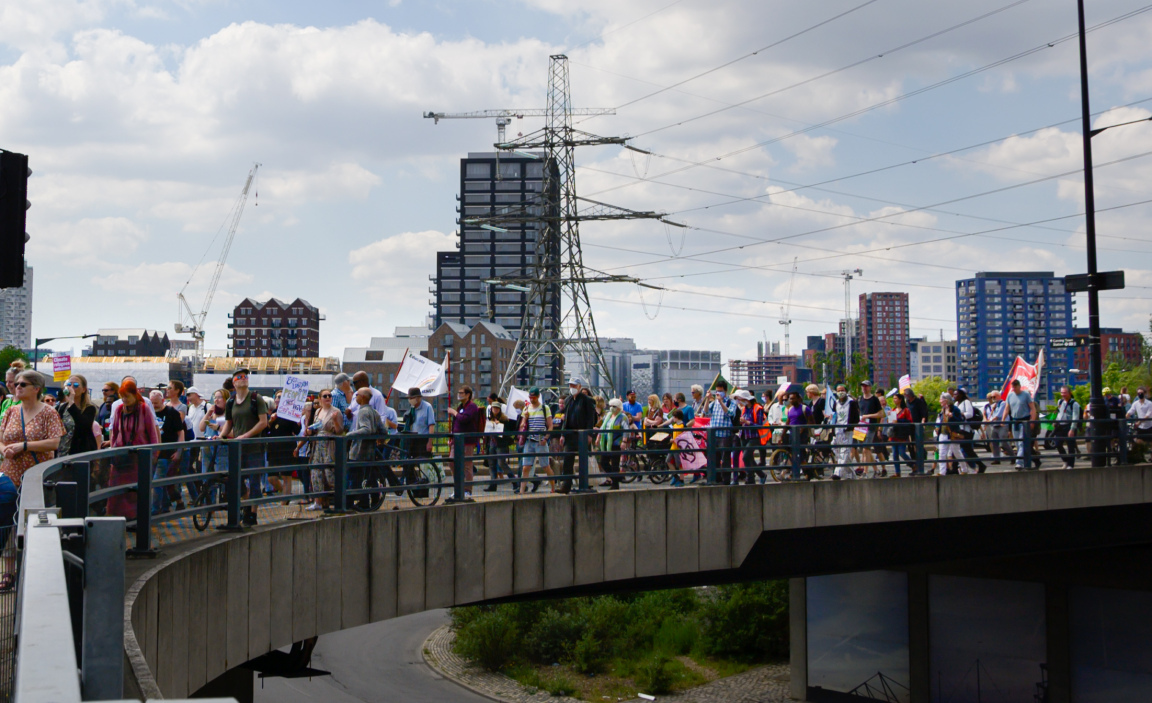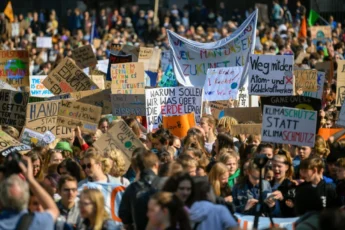
by TSS Platform
We publish an interview with Simon Pirani, energy researcher and historian who publishes regularly on the climate crisis and on its social and political implications. Simon shares socialist ideas about society, the earth and their interconnection on People and Nature. Among his many contributions we recall «Burning Up: A Global History of Fossil Fuel Consumption (Pluto Press, 2018). This interview is part of the Climate Class Conflict initiative we are promoting to provide a space for transnational discussion on climate struggles. We believe it is as urgent as ever to find common priorities that can tighten our political connections across borders and strengthen our otherwise fragmented initiatives. The interview will also be published in a shorter version in the upcoming “Climate Class Conflict Journal” with the contribution of many comrades participating in this TSS initiative. Simon helps us trace the most impending challenges for climate and class politics, and to reflect on how to make “connections explicit” among them. The threat of a climate catastrophe – which governments and capital won’t stop – pushes us to think about how to expand the political initiatives we are involved in, as global heating cannot be challenged without bringing about social change on a transnational level. While making more visible the existing relation between the green transition and governments’ aim to cope with the ongoing crisis in production and social reproduction, the war in Ukraine has exacerbated our difficulties in building a common front against States and capital decisions. Even when it is not materially connected with this or that State’s or local policy, the war affects our daily life as it is used to justify gas prices going sharply up or the economic support for fossil fuels extractions which will only work for oil companies and trash climate targets. In this perspective, what Simon argues about the ongoing plans for Ukrainian post-war reconstruction is crucial: while Putin’s war is hitting hard not only the State, but the whole Ukrainian population, the EU is starting to organise the neo-liberal transformation of Ukraine’s energy system, to make it apt for the single-market needs. This shows that the green transition is part and parcel of the climate of war EU and other States are fueling around the world, with growing militarism, violence and nationalism being the main targets that a transnational politics of peace, for social and climate justice has to confront. Moreover, it shows the importance of refusing the logic of war which forces us to take sides either with Putin, or with Western governments. Our climate and class effort should move toward making political and transnational connections explicit, so that we can cope with entangled conditions of subjugation and turn them upside down.
……….
TSS: In the last years, the climate movement – brought about mainly by young people – has used the strike as its main political tool to claim for a just transition and for climate justice on a global level. Which impact do you think this movement is having, in particular on social movements? Which are the main challenges do you think the climate movement have to face now?
Pirani: Thank you for these questions. First, it is worth thinking about the way that the meaning of “strike” has changed. As far as I know, for at least two centuries, “strike” had a fairly narrow meaning: a collective refusal to do paid work. It was the most basic weapon of working-class struggle against employers. But under the impact of feminist and other movements, “strike” has come to cover a wider range of actions. The school students’ “Fridays for Future” movement is one such action.
I wish I could answer your question about what impact this is having on social movements! I think, time will tell. There was a moment when the new movements that emerged in 2018 – in the UK, around “Fridays for Future” and Extinction Rebellion – seemed to have the potential to change social movements more broadly. Then came the pandemic and the whole process was disrupted. It really did make organising more difficult.
This year, with the worst of the pandemic over, I have noticed two trends. The first is the growth of protest around climate issues in Africa, and a recognition of that by groups in the global north. The Niger Delta has decades of history of organising against the oil companies whose extractivism trashed the local environment and impoverished the population: that is not new. But some new movements – especially against the renewed push to exploit gas reserves – appear to be broader. Coalitions such as Don’t Gas Africa and Stop EACOP (the East African Crude Oil Pipeline) are significant. And many groups in Europe have made solidarity with the global south a basic building-block of all that they do on climate issues.
A second trend is a movement among scientists, engineers and others who see speaking out about climate policy as their responsibility. A decade ago, scientists such as Michael Mann who spoke about policy were a small minority; now, Mann is outflanked by more politically radical people, such as those who recently called for civil disobedience in an article in «Nature Climate Change». Then there are organisations such as the Architects Climate Action Network, who speak with real authority about decarbonising buildings, a huge and necessary part of moving away from fossil fuels.
A big challenge is to bring these movements together in a way that effectively challenges the State and capital. We have just seen the frightful capture of the COP27 climate talks by oil companies and oil-producing nations. But ever since 1992, an important function of these talks has been hegemonic: to maintain a connection between state actions and civil society. Climate change is a global issue; people, however organised, are expected to address concerns about it to the State under which they live. The danger, from the point of view of State power, is that that connection is breaking. More and more people understand that states are willfully conspiring with capital to drive the world to disaster, and that that is hitting hundreds of millions of people across the global south right now. The challenge to us is to generalise and organise that movement to bring about social change, without which the juggernaut of global heating will keep accelerating.
Since the pandemic, the green and energy transition has emerged as a pillar of governments plans of reconstruction. In this sense, the green transition can be looked at as impacting both production and social reproduction. This makes it – for us – a terrain of struggle that climate movements must confront with. On which ground do you see this possible, considering the different conditions that women, workers, migrants, lgbtq+ people face on a transnational level in terms of effects of both the climate crisis itself and of its neoliberal government?
The first, urgent task is to deconstruct the words about “green transitions”. Many of these words are greenwash – that is, dressing up capitalist firms’ activities as green, to enable them to continue their businesses uninterrupted. I think greenwash is now more dangerous than climate science denial. Thirty or even twenty years ago, climate science denial was plausible. The damage done by global heating was not obvious to most people; in rich countries, it was largely invisible. The succession of hot summers, the flooding and heat waves that have hit the global north as well as the south, have changed that, and, I think, are a cause of the new types of movements on climate issues. But now we have this ocean of greenwash.
Here in London, we have a Labour mayor who claims to be the world’s greenest. We have been calling on him to cancel a road construction project, the Silvertown Tunnel. Any climate or transport researcher will tell you – in fact a big group of them told the mayor, last year – that there can be no big car-centred infrastructure in rich world cities if the climate targets are to be met. He not only refuses to listen, but builds a “green” reputation on the basis of (comparatively inexpensive) window dressing. The UK government, unsurprisingly, is even worse, talking about “green transition”, while licensing new oil fields, and planning road projects of its own. And then the European Union, supposedly a major force for decarbonisation, in July deemed gas and nuclear to be “green” fuels for investment purposes. This is about money: fossil fuel companies can add this to the massive advantages of incumbency when competing with renewables. In all these cases, the greenwash is combined with technofixes: electric vehicles, hydrogen, carbon capture and storage – all of dubious value in terms of decarbonisation, but all easy routes to capital accumulation.
This greenwash and techno-babble truly takes us on the road to catastrophe. The great power of social movements, of labour movements, needs to be turned against it. That in turn means that, within those movements, we need to pay closer attention to technologies, and the relationship between technologies and social change. There are technologies that can both destroy massive chunks of fossil fuel consumption, and also serve communities and enhance social justice. In Europe, since the price of gas – that is used to heat homes – has gone through the roof, nothing could be more relevant than insulating homes and fitting them with electric heat pumps. Even if you produce the electricity from gas, an electric heat pump heats a house on average four or five times more efficiently than a gas boiler. If the house is insulated properly, which most working people’s homes are not, even less electricity is needed.
At a time when millions of working people are faced with un-payable energy bills, socialists should be screaming about these technologies from the rooftops, and marching to the centres of local and national government to demand they are immediately introduced. This could bind together the climate issue with the growing movements in response to inflation and in defence of living standards. In transport, equally basic technologies should be claimed as ours: bike lanes, electric scooters, cheap or free public transport – as against road projects and electric cars. Then we can open up the prospect of integrated urban energy systems, and seek ways to confront capital, and the State, who have everything to gain by postponing such changes, by limiting themselves to incremental change to current systems, kept firmly under their control.
There is no unanimity on these issues among writers claiming to advance socialist answers to the climate crisis. Indeed Jacobin, one of the biggest “left” English-language journals, prefers to discuss technofixes such as direct air capture; Verso, the “left” publishing house, churns out books (e.g. this and this) advocating this technology. What is this obsession with big, State-managed – and highly speculative – technology? In my view it is part of the obsession on the “left” with big, State-managed change. Such approaches downplay the power of social movements, indeed the power of society to do anything.
Your question about the intersection of climate issues with the issues facing women, workers, migrants and LGBTQ+ people is very broad! And it’s important that we ask these very broad questions. But I don’t think there are any easy answers. I think that the point I have already made – about the potential for uniting movements around climate with struggles around the cost of living – applies to women, LGBTQ+ people and migrants as much as to other workers. To the extent that migrants, women and LGBTQ+ people already bear the burden of other inequalities, the cost-of-living crisis is hitting them hardest.
Capitalist society is full of manifold injustices, and these are exacerbated by climate change in many ways. So for example in our campaign about the tunnel project in London, we have argued that the tunnel is both bad for the climate (because it adds to excessive road traffic in a rich-world city) but also bad in terms of the local air pollution produced by that traffic. The borough of Newham, in to which the tunnel will empty traffic on the north side of the river Thames, has one of the worst air pollution problems in the UK – and also one of the poorest, and the most ethnically diverse, populations. Infrastructure projects, championed not by our deranged Tory government but by the Labour party, are piling misery on the most vulnerable people in society. The connections are real: we need always to make them explicit.
Putin’s invasion of Ukraine has had devastating effects first on Ukrainians forced to fight or flee to save their lives, and then also on the global political scenario. If we look at the war from a European standpoint, we see how deeply it has affected EU plans for green and energy transition, the RePowerEU being just one of the many legislative frameworks established in order to face the energy crisis produced by the war. Which are the main effects you see the war has had on green EU policies, and how do you think they affect climate movements’ possibilities to struggle against the green transition?
I would like to make a point about causes and effects. The fact of the war has disrupted the export of grain, sunflower oil and other agricultural products from both Russia and Ukraine, and, as well as fuelling inflation, that has produced a danger of food shortages in north Africa especially. Then there is the so-called “energy crisis” – which we should deconstruct.
In the case of oil, Russian output has fallen due to western government sanctions. But the huge rise in oil prices means that, for now, Russia’s revenues from oil sales are much greater than they were last year. While oil remains Russia’s main source of cash, gas is symbolic of a profitable trading relationship built with Germany and other western European countries over the last forty years. That relationship has been wrecked, by the Kremlin’s own decisions. The Kremlin, which controls the largest gas company, Gazprom, decided from early last year to limit volumes of gas delivered to Europe, to exert political pressure. Since the invasion of Ukraine in February, Gazprom has turned the taps down further, and failed to deliver the volumes it is required to under long-term contracts.
The Kremlin has smashed up its trading relationship with Europe for the sake of its imperialist military adventure in Ukraine. This is the first reason wholesale gas prices went up so sharply. The second reason is that the wholesale gas market has been completely liberalised, and that model tends to magnify the price effects of shortages. Some European governments had measures in place to protect households from the worst effects of these crazy wholesale prices; others, like the UK’s, did not.
The RePowerEU measures have been challenged – correctly, I think – by energy researchers and urban policy specialists. They say that the most effective measures to reduce dependence on Russian gas are crash programmes to insulate homes and install heat pumps, as I mentioned before, and to increase electricity production from renewables. Instead of doing this, European politicians have used the “energy crisis” as an excuse to encourage massive new investments in oil and gas production. They are supporting development of fossil fuels that should be left in the ground. Once such oil or gas project are approved, it takes up to ten years to get supplies out of them. So this has absolutely nothing to do with solving the problem of gas supply for this or next winter. It’s a way of smuggling a lifeline to oil companies, to allow them to trash climate targets.
How do you think climate and class politics can relate with each other in the war scenario we live in, so to overcome artificially fabricated divisions between climate activists’ and workers’ interests?
The outlines of the type of politics that could unite class and climate movements seem clear: a crash programme of home insulation and heat pumps; extend forms of State and social ownership over electricity networks, so that they are not run for profit; the burden of high gas prices must not be forced onto households; electricity and heat should be provided as a service or a right; prioritise renewable electricity and integration of energy systems in the public interest; align the energy systems with measures to tackle global heating.
The main way to tackle global heating is to reduce the use of fossil fuels. And the point we need to hammer home is that many of the technologies needed to do this already exist; the obstructions arise from the way that States manage economies and societies in the interests of capital. Social change that confronts the State can also push forward decarbonisation. The example of insulation and home heating, or public transport instead of electric cars, are just the most obvious ones. The same principle can be applied across the whole of society.
The extreme right approaches the issue from the opposite side. They claim that households’ spiralling energy bills are a result of governments’ military spending to aid Ukraine, which they are not; they present this as a burden being put on working people’s shoulders, along with (of course) Ukrainian refugees. We are also witnessing the shameful sight of “leftists” in western Europe going along with this narrative, and linking it to their false claims that the murderous Russian invasion was caused by NATO, as though the Kremlin had nothing to do with it. Unity of social struggles with climate struggles is also a means to push back and defeat the right’s influence.
The war is still ongoing, it is difficult to read in all its military dynamics, and it is now in an escalating phase. At the same time, this is not dissuading the EU from starting to undertake plans for Ukrainian post-war reconstruction, which entail reforming its energy system to make it apt for European market standards. Can you tell us more about this ongoing process? Which challenges does the post-war reconstruction pose to labour and social and climate movements both in Ukraine and outside the country?
It is too soon to say what the reconstruction of the Ukrainian energy system will involve. As far as it’s possible to tell from the news, the Russian missile attacks in October knocked out one third of the power stations. By November, the power cuts were so bad that the government was arranging evacuation of civilians from front-line areas, because there may be no way of providing heat and light over the winter. This relentless bombing of civilian infrastructure epitomises the type of war being fought by the Kremlin: a war not only against the Ukrainian state but also against the Ukrainian population.
Despite the extremely difficult circumstances, Ukrainian socialists have outlined policies for post-war reconstruction based on public investment, defence of labour rights and cancellation of Ukraine’s foreign debt. These proposals stand in sharp contrast to the plans made by the European Commission and the Ukrainian government, which envisage more privatisation, opening up space for markets in neoliberal style, and renewed assaults on labour rights. I hope these issues are more widely discussed in social and labour movements across Europe.
Reconstruction of the energy system was discussed at a recent on-line event organised by Spilne (Commons), the Ukrainian socialist journal. I suggested principles that Ukrainian social movements could bear in mind for post-war reconstruction, including (i) a focus on electricity from renewables (which could drastically reduce the use of coal and gas); (ii) the potential for reducing the throughput of energy (which is great, because old, energy-inefficient infrastructure will need to be replaced anyway); (iii) that energy provision is a right, or a service, not a commodity (which is in line with the Ukrainian socialists’ opposition to neoliberal impositions); and (iv) the use of technologies that are compatible with our aims of social justice and the struggle against capital.
A technology that we should definitely oppose is the production of hydrogen from renewable electricity in Ukraine, for export to European countries. This proposal, supported by the European Commission and the Ukrainian government, stinks of neo-colonialism and greenwash. The issue of nuclear power – which has strong support within the Ukrainian government – also came up in our discussion. While in the short term, the Ukrainian electricity system will need nuclear power to help keep the lights on, there is no reason on earth why socialists should support the expansion of this expensive, inevitably State- and military-connected, technology. Renewable electricity, and energy conservation measures, don’t solve everything overnight, but they should be our focus for combining the fight to halt global heating with our aims of social justice.





